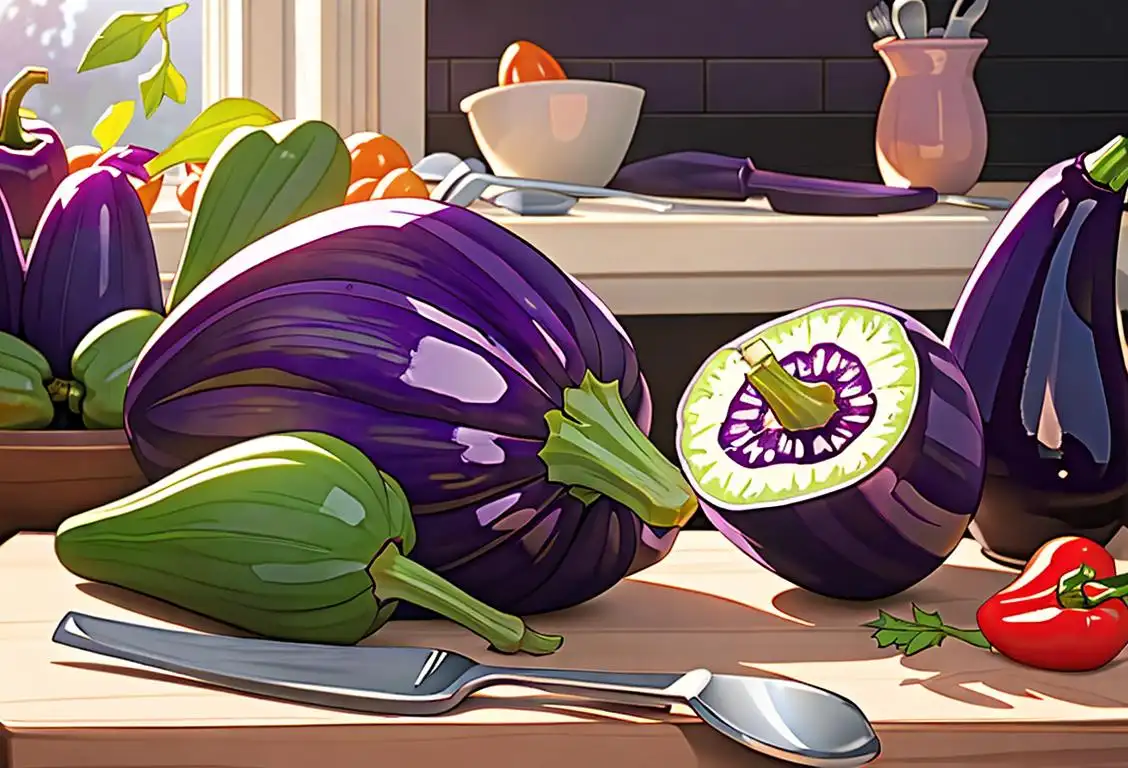National Eggplant Day

Welcome to the juicy, purple, and unexpectedly exciting world of Eggplants! Yes, you read that correct. Prepare yourself for an, eggstraordinary (get it?) journey as we celebrate National Eggplant Day, a day with 36 glorious mentions on the internet, with the big e-aubergine-nza culminating on August 17th, 2020. Who would have thought that this humble veggie could steal the limelight on such a global scale? But hey, on the internet, anything goes!
When is Eggplant Day?
It's national eggplant day on the 17th August.
A Purple Day for the Purple Veggiliciousness
Gather your cutlery and veggies folks, it's all about the eggplant today! The day is dedicated to paying homage to the pride of everybody's garden - the violet vegetable that's just brimming with nutritional goodness! But do you know why we commemorate the deep purple food sensation annually? No? Well, allow us to eggstound (too far?) you with some eggplant enlightenment!
The History of National Eggplant Day
Surprisingly, this eggcellent day (sorry, I can't resist!) didn't start in a farmer's market or culinary school. No sir, National Eggplant Day is a full-blown child of the internet. With its roots tied to the virality universe of hashtags, GIFs and all that jazz, it sprung into being as people shared their love for this coloured queen of veggies. The most movement was seen on August 17th, 2020, marking National Eggplant Day as an internet phenomenon. So next time you're whipping up an eggplant dish, snap a pic – you'll be contributing to a global online celebration!
How to Celebrate National Eggplant Day?
From moussaka and baba ganoush, to delicious stir-fry and grilled renditions, the eggplant shows that it's nothing short of culinary versatility. On August 17th, broaden your cooking horizons and celebrate by trying a new eggplant recipe. Share with friends, and on social media, bringing attention to this vibrant vegetable. Or better yet, grow your own eggplant at home. There's nothing quite like the feeling of eating something you've proudly grown yourself.
History behind the term 'Eggplant'
2nd century BCE
Ancient Origins
The history of the term 'eggplant' can be traced back to ancient times. The vegetable itself, a member of the nightshade family, has its origins in India and Southeast Asia. In these regions, it was cultivated and consumed over two thousand years ago. However, it wasn't referred to as 'eggplant' at that time.
1555
Introduction to Europe
The eggplant, known as 'aubergine' in Europe, was introduced to the continent around 1555. It originated in India and was brought to Europe by the Moors during their occupation of Spain. Initially, it was not well-received and was primarily grown for decorative purposes in royal gardens.
14th century
The Arabic Arrival
The term 'eggplant' has its origins in the Arabic language. The Arabic word for eggplant is 'bāḏinjān', which was derived from the Persian word 'bādingān'. It was during the medieval period in the 14th century that the Arabs introduced the eggplant to Europe. They brought this strange-looking vegetable, with its glossy purple skin, to Spain and other Mediterranean countries.
16th century
The Italian Influence
In the 16th century, Italian explorers encountered the eggplant in their journeys to the East. They were captivated by its unique flavor and vibrant color. The Italians first called the vegetable 'mala insana', which translates to 'mad apple', likely due to the misconception that eating eggplants could lead to insanity. However, this name did not stick, and eventually, the Italians adopted the Arabic word 'bāḏinjān' and transformed it into 'melanzana'.
5th century CE
Arabic Influence
During the Islamic Golden Age, Arabic scholars played a significant role in the transmission of knowledge and culture. In the 5th century CE, traders and scholars brought a purple-colored vegetable from India to the Middle East. The Arabic influence led to the development of new names for this exotic vegetable, one of which was 'al-badinjan'.
1767
Name Evolution
The term 'aubergine' was derived from an Arabic word, 'al-badinjan.' However, over time, the name started to change. In 1767, the French botanist Joseph Pitton de Tournefort used the word 'aubergine' to describe the plant, which eventually became the common term used in France and some English-speaking countries.
18th century
The British Evolution
During the 18th century, the British encountered the eggplant and decided to give it a new name. The shape and color of the vegetable reminded them of eggs, and thus it became known as 'eggplant'. This name was coined in reference to the British variety of eggplants, which were white and resembled the size and shape of goose eggs. The term 'eggplant' quickly gained popularity in Great Britain and subsequently spread to other English-speaking countries.
16th century
The Italian Renaissance
As trade routes expanded during the Renaissance, the 'al-badinjan' made its way to Italy. Italian botanists and merchants were captivated by the vegetable's unique shape and vibrant color. They adopted and adapted the Arabic term to 'melanzana'. From 'melanzana', it eventually transformed into the term 'eggplant' used today.
1806
The Rise of 'Eggplant'
In 1806, the English adopted the phrase 'eggplant' due to the variety of colors and shapes resembling eggs. This name stuck in the United Kingdom and became the widely accepted term in North America as well. Although it gained popularity, some Europeans continued to use 'aubergine.'
18th century
The British Connection
With the British Empire's exploration and colonization efforts, the eggplant found its way to England. In the 18th century, English gardeners and cooks started growing and experimenting with this intriguing vegetable. Due to its resemblance to certain white and yellow egg varieties, it became known as the 'eggplant' in England.
1859
Culinary Recognition
As time went on, people started discovering the culinary potential of the eggplant. It was during the late 19th century that the versatile vegetable began appearing in various recipes and cookbooks. With its ability to absorb flavors and adapt to different cooking methods, chefs and home cooks began embracing the eggplant as a staple ingredient.
19th century
Global Diffusion
In the 19th century, as trade and exploration expanded across the globe, the eggplant made its way to various countries and cultures. It became a staple ingredient in Mediterranean and Middle Eastern cuisines, contributing to iconic dishes like baba ganoush and moussaka. The spread and adoption of the term 'eggplant' helped in standardizing its name in different languages and solidifying its place in global culinary traditions.
19th century
American Adoption
The eggplant made its way to the United States during the 19th century through immigration and trade. Initially, it faced skepticism and uncertainty, as it was unfamiliar to many Americans. However, as Italian immigrants introduced their cuisine, which prominently featured eggplant, it gained popularity and acceptance in American culinary culture.
20th Century
Global Popularity
Throughout the 20th century, the eggplant gained widespread popularity in many cuisines around the world. From Mediterranean dishes like moussaka to Asian favorites like baba ghanoush and stir-fries, the eggplant became a symbol of culinary diversity. Its unique flavor and spongy texture continue to make it a beloved ingredient in countless recipes today.
Did you know?
Fun eggplant fact, ready? Here it is: did you know that eggplants aren't actually veggies but berries? Yep, be prepared to have your minds blown because technically, they're from the berry family. Who would've thought?Tagged
awareness food fun loved ones rememberanceFirst identified
4th February 2016Most mentioned on
17th August 2020Total mentions
36Other days
Happiness Day
Bbq Day
First Responders Day
Meatball Day
Trivia Day
Cheese Lovers Day
Biscuit Day
Pumpkin Day
Agriculture Day
Knife Day









